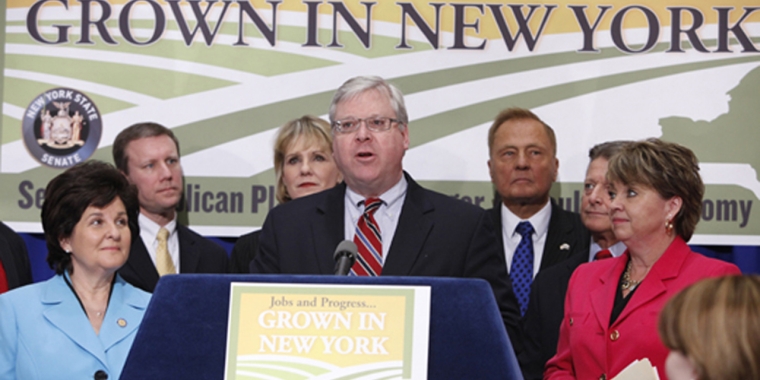
O'Mara: 'Grown in NY' replanting efforts to encourage next generations of farmers
Thomas F. O'Mara
March 6, 2015
-
ISSUE:
- Agriculture

Albany, N.Y., March 5—State Senator Tom O’Mara (R-C, Big Flats), a member of the Senate Agriculture Committee, and his Senate colleagues have introduced the next phase of their “Grown in New York” agricultural development strategy and will seek to include key portions of it in the new state budget.
Since 2013, O’Mara and other senators have pushed the comprehensive legislative strategy aimed at keeping New York State’s leading industry competitive for the next generation.
"We need to keep taking actions that can help keep our next generation of farmers competitive for the long haul. We can’t risk New York State’s young farmers being taxed, regulated and priced out of business. The ‘Grown in New York’ plan is a bold, common sense blueprint to keep New York a proud and strong agricultural state, and we’re hopeful that we can enact even more pieces of the strategy this session,” said O’Mara, who also serves as one of 10 members on the Legislature’s joint, bipartisan Commission on Rural Resources. “Farming has been a mainstay of upstate New York’s culture and economy for centuries, and it remains the backbone of many of our communities. But the challenges and the competition are tougher than ever.”
Over the past few years, “Grown in New York” has helped initiate critical new laws and programs to assist farmers and the entire agricultural industry, including a new program last year to provide start-up grants to beginning farmers.
This year, as part of “Grown in New York,” O’Mara said the Senate will seek the inclusion of the following in the 2015-2016 state budget:
> the creation of the “Cornell NYOneStop Program” which, based at Cornell University, would be the first comprehensive program to help farmers navigate regulations and find information about programs and services that can grow their businesses;
> long-overdue upgrades to Cornell’s world-leading Geneva Experiment Station, where applied research is solving problems ranging from plant disease to improved agriculture practices, increasing yields and ensuring farm success;
> the statewide expansion of Cornell’s successful Harvest NY program;
> the creation of up to five local transportation cooperatives where farmers can arrange to move their products to New York City and other major metropolitan areas;
> an expansion of last year’s Young Farmer Student Loan Forgiveness Program to include agriculture educators as well as farm operators;
> additional support for school-based agricultural education, including Future Farmers of America and BOCES-based agricultural science education;
> on-the-job training to aspiring farmers through the Cornell Cooperating Farm Apprenticeship;
> the creation of a Farm Bank, which would link new farmers with public and private land owners to create better opportunities for new farmers;
> creation of a Grown in New York marketing brand to help consumers identify NY-grown and farm-made products that contain at least 75 percent local ingredients;
> an expansion of the United States Department of Agriculture’s “Senior Farmers Market Nutrition Program” to reach more senior consumers across the state;
> a greater incentive to encourage schools to choose locally produced food; and
> support for directing additional clean energy resources to farm-based projects, including the installation of solar technology and construction of new digesters.
[see the attached "Grown in New York" Fact Sheet for additional details]
New York is home to 36,000 family farms that contribute to the state’s more than $5.7-billion agricultural industry.
Share this Article or Press Release
Newsroom
Go to Newsroom


